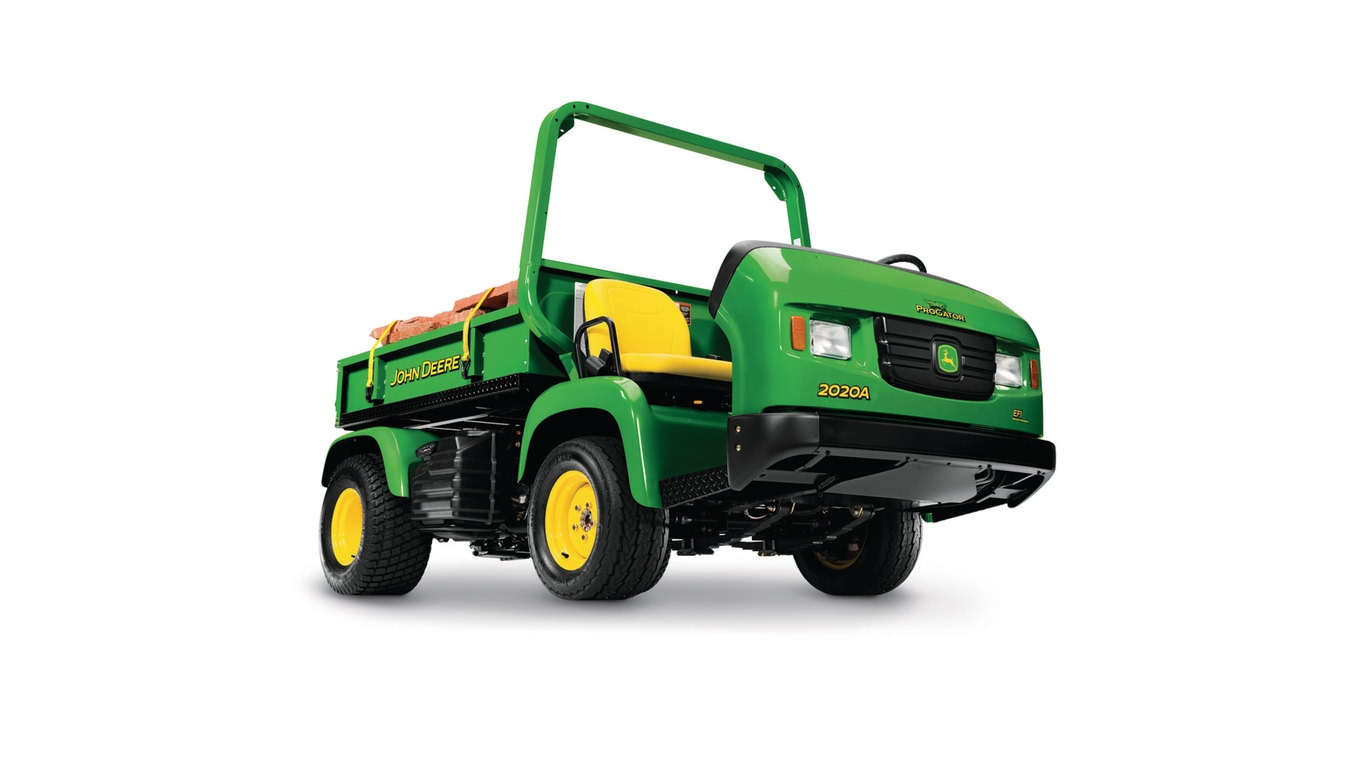
John Deere 2020A
ProGator™ Utility Vehicle
- High-torque gas engine
- Thick 7-gauge steel frame
- Car-like transmission
- Easy maintenance
Features
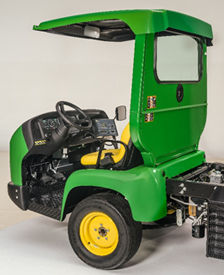 Canopy kit with rear view mirror and rear panel kit
Canopy kit with rear view mirror and rear panel kit
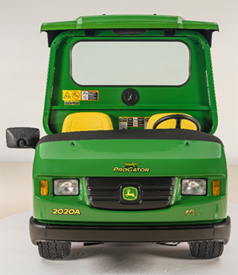 Canopy kit with rear view mirror and rear panel kit
Canopy kit with rear view mirror and rear panel kit
The ProGator™ 2020A, 2030A, 2020A GPS, and 2030A GPS now feature an optional roof with rear view mirror and separately a rear panel with glass. The roof provides overhead relief from the sun and rain while performing golf course and sports turf tasks. Easy install and high functionality make this a must for every grower.
Whether spraying, topdressing or hauling, these kits will make the job easier.
Design:
The roof kit is designed to fit onto either a four-post rollover protective structure (ROPS) or standard ROPS. It offers shade for the operator from the sun and provides an environment conducive to viewing displays used for spraying activities. The rear view mirror is part of the kit and increases the viewable area behind the vehicle and aids in viewing the right side boom when the HD200/HD300 Sprayer is installed.
The rear panel kit is designed to be used in conjunction with the roof kit, or separately by itself. Operators can expect some noise dampening and relief from chaff and airborne debris when using the rear panel kit.
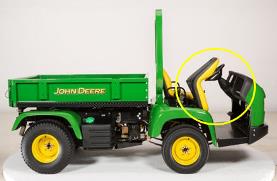 Flip-up seat (passenger side)
Flip-up seat (passenger side)
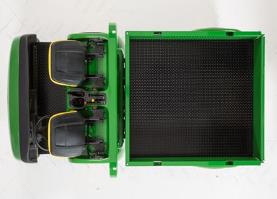 Flip-up seats (passenger and driver sides)
Flip-up seats (passenger and driver sides)
- Flip-up seats are now available.
- Flip-up seats are standard for both passenger and driver sides.
- Standard for 2030A, 2020A, 2030A GPS, and 2020A GPS models.
- Easy to flip up to keep seat clean and dry.
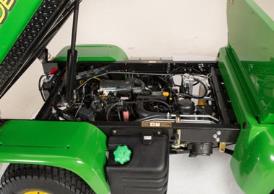 Model Year 2015 ProGator 2030A with Tier IV Engine
Model Year 2015 ProGator 2030A with Tier IV Engine
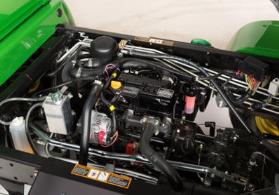
- Tier IV compliant engine
- An increase of 1.12kw (1.5 hp) over previous model year.
- Exhaust muffler has been rerouted.
Muffler is now oriented in a horizontal position that will eliminate browning of turf when unit is parked on turf when running
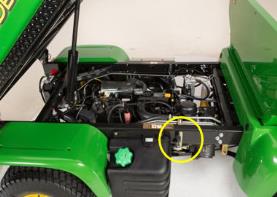 Air restriction indicator
Air restriction indicator
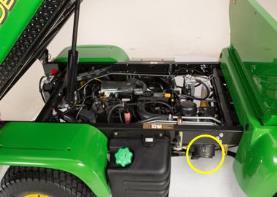 New air cleaner and position
New air cleaner and position
- New air cleaner
- Serviceable without raising vehicle bed.
- Increased from a 101.6-mm (4-in.) filter to a 127-mm (5-in.) filter.
- Air restriction indicator
- Has been moved to the right side of unit, now found outside of frame.
- Easier access for daily check and evaluation activities.
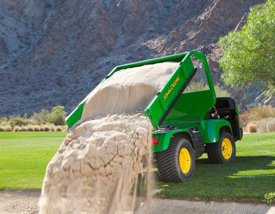 ProGator payload
ProGator payload

Maintaining a golf course is a very demanding job, from filling bunkers to hauling landscape rock to spraying 1135 L (300 gal.) of water on fairways. Demanding jobs require rugged vehicles that are up to the challenge of high payload capacities, and the ProGator™ 2020A and 2020A GPS Utility Vehicle delivers.
The ProGator 2020A and 2020A GPS offers a versatile package, including attachments that can be removed and installed in minutes without tools, such as the SelectSpray™ Series, TD100 top dresser, and cargo box. Optional heavy duty front and rear suspensions, when combined with the four-post rollover protective structure (ROPS) and wide rear tire kit, provide payload capacity that exceeds two tons. Payload capacities are as follows:
| Capacities | ProGator 2020A and 2020A GPS |
Payload capacity (including 90.7-kg [200-lb] operator, 90.7-kg 200-lb] passenger, and loaded attachment), lb (kg) |
|
| Two-wheel drive (2WD) with standard suspension and two-post ROPS | 1592 kg (3510 lb) |
| Four-wheel drive (4WD) with standard suspension and two-post ROPS | 1530 kg (3374 lb) |
| 2WD with heavy-duty suspension, wide rear tire kit, and four-post ROPS | 1928 kg 4251 lb) |
| 4WD with heavy-duty suspension, wide rear tire kit, and four-post ROPS | 1867 kg (4215 lb) |
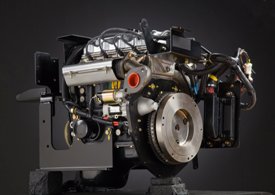 Gas engine
Gas engine

Working with higher payloads requires a tough power plant. A powerful 25.4-kW (34-hp), 970-cc automotive-grade gas engine with electronic fuel injection (EFI) is the heart and soul of this strong package. Featuring an industry exclusive 4-cylinder design, electronic throttle control, and full-pressure lubrication, this gas engine provides plenty of power and technology. EFI provides the ultimate in efficient fuel delivery control for responsive acceleration and excellent fuel economy. The EFI system also provides quick and easy starting, even on cold mornings, without the need for a choke.
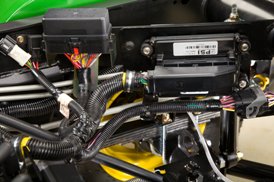 Engine controller
Engine controller
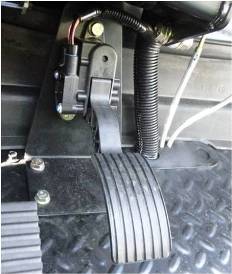 Throttle pedal
Throttle pedal
The engine controller is located under the cargo box and inside the right rear corner of the ProGator frame. The throttle system is drive-by-wire, meaning that the throttle position on the engine has no mechanical linkage back to the accelerator pedal. Instead, the accelerator pedal has an electronic potentiometer that senses the position of the throttle pedal, and in turn the engine controller then electronically sets the corresponding engine rpm. This provides for a clean overall setup by minimizing the linkage required to control the throttle, while also providing for quick response to accelerator pedal position changes.
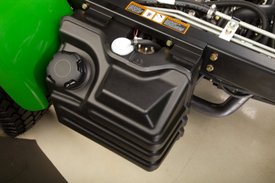 Gas fuel tank
Gas fuel tank

The fuel system package features a large 30.7-L (8.1-US gal.) EPA- and CARB-compliant fuel tank, providing plenty of on-board fuel for those long days of spraying fairways and roughs with minimal stops to refuel. And on those long days, operators appreciate comfort and minimized vibration. The engine mounting system is rubber isolated to reduce vibration at the operator station, enhancing operator comfort for the long haul.
*At 3600 rpm - engine manufacturer gross power. Tested in accordance with SAE J1349. The engine horsepower and torque information are provided by the engine manufacturer for comparison purposes only. Actual operating horsepower and torque will be less. Refer to the engine manufacturer’s Web site for additional information.
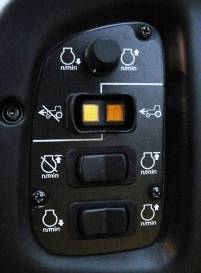 Multi-mode throttle control
Multi-mode throttle control

One of the key features of the electronic fuel injection (EFI) gas engine is the electronic capabilities for precise engine control. As a result of this technology, controlling engine rpm for spraying, topdressing, and spreading is now easier and more precise than ever before with the optional multi-mode throttle control.
The multi-mode throttle control sets the maximum engine rpm for product applications. The reason the system is called multi-mode is that the system can be utilized in three different ways – normal throttle mode (Mode 0), a PTO mode for stationary applications (Mode 1), and a mobile mode for moving applications (Mode 2). If an operator wants to spray at 5.6 km/h (3.5 mph) in second gear at 40 psi (2.8 bar), the result would be an engine rpm of 2800. This lower rpm occurs when the multi-mode throttle control is set so that while the operator is spraying, the maximum engine rpm with the throttle pedal fully depressed would be 2800 rpm instead of the normal 3400 rpm.
The multi-mode throttle control includes four sets of switches. The first switch at the top is a hand-throttle-control dial that is used to set the engine rpm in PTO mode. This would be used for walk spraying and handgun operation, applications which require the ProGator™ Utility Vehicle to be stationary for application.
The second switch is the mode-select switch. Toggle the mode-select switch to the left for PTO mode, toggle to the right for mobile mode, and toggle to the center for normal mode. The reverse Z-shaped line on the decal shows which switches are used for PTO mode (dial only), and which ones for mobile mode (bottom two switches). For walk spraying, simply toggle the mode-select switch to PTO mode then, with the parking brake set and the operator off the seat, turn the dial clockwise to increase engine rpm and counterclockwise to decrease engine rpm . Simply toggling the mode-select switch back to the middle position allows the engine to return to a full operating rpm for transporting. When arriving at the next green, toggle the mode-select switch back to PTO mode, and the rpm will automatically return to the rpm as set by the dial.
The mobile mode is for applications that require the ProGator to be moving during product application. The first switch below the mode-select switch is the set/clear switch. Once the operator achieves the desired target speed, simply toggle the mode-select switch to mobile mode and the set/clear switch to the right (set position) to set the maximum rpm. The operator can then push the pedal to the floor, and the engine rpm will not exceed the new maximum rpm that has been set. As the operator lets off the throttle, the engine will also reduce the throttle, but a new maximum will have been set. To go back to full rpm for transporting, simply stop the machine, toggle the mode-selector switch back to the center (normal) position to return to the normal operating rpm range. As the operator arrives at the next area and is ready for application, toggle the mode-select switch back to the mobile mode position to return to the preset maximum rpm established earlier.
The bottom switch is the accelerate/decelerate switch. To increase or decrease engine rpm in 100 rpm increments while in mobile mode, simply toggle the switch to the right to increase or to the left to decrease rpm. This is a momentary switch, so each push of the button represents a 100 rpm increase or decrease.
This innovative, easy-to-use system sets a new standard for the ultimate in application control.
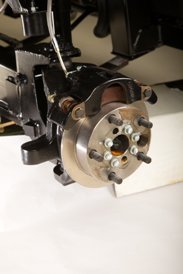 Disk brake overview
Disk brake overview

The ProGator™ Utility Vehicle features a premium disk braking system that consists of four, 190.5-mm (7.5-in.), disks. The disks are cast from vibration-resistant G3000 grey iron and four identical single-piston floating calipers. The brakes are hydraulically actuated for easy pedal effort and excellent performance.
The service linings are constructed of a proprietary noise-resistant organic blend for an excellent mix of life and performance. Brake pedal feel is enhanced with large caliper pistons and flexible brake lines improve routing efficiency and allow for ease of service.
The parking brake lever is conveniently located in the center of the operator station and features a pistol grip handle for maximum comfort and ease of use. The parking brake system utilizes a ball ramp-style mechanism, meaning no adjustment at the mechanism itself, only at the equalizer.
Routine maintenance can often require additional hours for a technician. With sealed bearings throughout the machine, the ProGator™ Utility Vehicles will save the technician plenty of time. 2WD machines feature all sealed bearings and no grease zerks, while four-wheel drive (4WD) machines have only three grease points on the 4WD shaft.
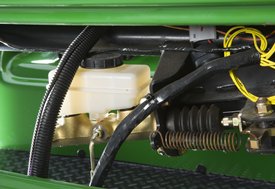 Brake fluid fill
Brake fluid fill

Filling brake fluid is also quick and easy and requires no tools. The front grille of the ProGator is removed simply by pulling it outward from the front of the machine, providing easy access to the brake fluid reservoir. All other daily service points are accessed by simply lifting the cargo box and securing with the lift cylinder safety support. This provides quick access to the coolant level check, engine oil dipstick, and air-restriction indicator.
The ProGator™ heavy-duty utility vehicles feature an optional cargo box for hauling items on the golf course. The cargo box attaches to the ProGator easily, utilizing only two rear pivot pins and one lift cylinder pin. This allows quick and easy changes between ProGator attachments.
A 16-gauge steel frame provides added strength and durability. A standard hydraulic lift and lower cylinder allow for easy lifting of the cargo box to dump sand and other items from the cargo box quickly and easily.
The optional tailgate release kit allows for a dump truck mode, where the tailgate automatically opens from the bottom when the tailgate is raised to allow items to flow out of the box. The tailgate then automatically closes when the box is lowered for fast and efficient operation.
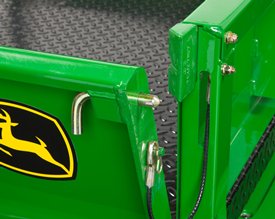 Cargo box pin system and striker plate
Cargo box pin system and striker plate
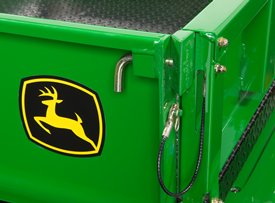 Cargo box in locked position
Cargo box in locked position
For normal tailgate operation, opening and closing the tailgate is easier than ever. An innovative retractable pin system is the key. A spring-loaded L-pin is located on each end of the cargo box.
To open the cargo box, simply pull the L-pins inward and lower the tailgate. Closing the tailgate is even easier. The angled striker plate design allows the L-pins to automatically retract when shutting the tailgate. When the cargo box is fully closed, the springs will pull the pins into their locking position. This allows for a one-handed closing of the tailgate, similar to that of a pick-up truck.
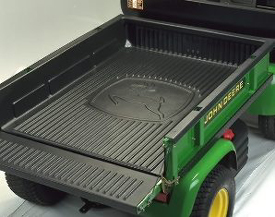 ProGator A Series bedliner
ProGator A Series bedliner
A bedliner can be ordered as an optional attachment for the ProGator machines. The high-density polyethylene bedliner is stamped with the John Deere logo and protects the steel cargo box and paint from dirt and debris.
The bedliner is designed to wrap around the bottom of the tailgate, preventing gravel and other debris from getting trapped under the bedliner. The bedliner ribs are tapered, allowing materials to flow freely out of the cargo box when it is lifted or being cleaned.
Specs & Compare
Key Specs | 2020A Current Model |
| Maximum speed (standard tires) | 30.7 km/h 19.1 mph |
| Displacement | 879 cc 53.6 cu in. |
| Horsepower | At 3600 rpm: 25.4 kW 34 hp Engine manufacturer gross power. Teseted in accordance with SAE J1349. Engine hp and torque information are provided by the mfr for comparison purposes only. Actual operating hp and torque will be less. Refer to engine manufacturer's website for additional information. |
| Maximum gross vehicle weight (4WD with heavy-duty suspension, wide rear tire, and four-post ROPS) | 2841 kg 6264 lb |
| Transmission configuration | Five-speed synchro-mesh with five forward gears and one reverse gear |
| Turning circle clearance (Inside diameter - 2WD) | Radiu: 431.8 mm 17 in. |
Engine | |
| Manufacturer/model | |
| Horsepower | At 3600 rpm: 25.4 kW 34 hp Engine manufacturer gross power. Teseted in accordance with SAE J1349. Engine hp and torque information are provided by the mfr for comparison purposes only. Actual operating hp and torque will be less. Refer to engine manufacturer's website for additional information. |
| Configuration | Four-cylinder liquid-cooled gas |
| High idle speed | 3570 rpm |
| Displacement | 879 cc 53.6 cu in. |
Transmission | |
| Manufacturer | Kanzaki |
| Configuration | Five-speed synchro-mesh with five forward gears and one reverse gear |
| Maximum speed (standard tires) | 30.7 km/h 19.1 mph |
| 4WD options | Manual engage on demand |
Dimensions | |
| Ground clearance (unloaded) | 168 mm 6.6 in. |
| Bed height (loaded) | 832 mm 32.75 in. |
| Wheelbase | 167.6 cm 66 in. |
| Wheel tread, front | 123.2 cm 48.5 in. |
| Wheel tread, rear standard | 129 cm 50.8 in. |
| Width, overall (standard tires) | 158.6 cm 62.4 in. |
| Length, overall (standard tires) | 319.2 cm 125.7 in. |
| Length, overall with box | 328.5 cm 129.3 in. |
| Length, overall without box | 319.2 cm 125.7 in. |
| Height, overall | 193.6 cm 76.25 in. |
Steering | |
Turning circle clearance | |
| Inside diameter - 2WD | Radiu: 431.8 mm 17 in. |
| Inside diameter - 4WD | Raidus: 1752 mm 69 in. |
Capacities | |
| Maximum gross vehicle weight(includes 200-lb operator, 200-lb passenger, loaded attachment) | 2WD with standard suspension 2449 kg 5400 lb 4WD with standard suspension 2449 kg 5400 lb 2WD with heavy-duty suspension, wide rear tire, and four-post ROPS 2841 kg 6264 lb 4WD with heavy-duty suspension, wide rear tire, and four-post ROPS 2841 kg 6264 lb |
| Base machine weight (no passenger, no operator, no loaded attachment, full fluids) | 2WD with standard suspension 857 kg 1890 lb 4WD with standard suspension 919 kg 2026 lb 2WD with heavy-duty suspension, wide rear tire, and four-post ROPS 913 kg 2012 lb 4WD with heavy-duty suspension, wide rear tire, and four-post ROPS 975 kg 2149 lb |
| Payload capacity (includes 200-lb operator, 200-lb passenger, and loaded attachment) | 2WD with standard suspension 1592 kg 3510 lb 4WD with standard suspension 1530 kg 3374 lb 2WD with heavy-duty suspension, wide rear tire, and four-post ROPS 1928 kg 4251 lb 4WD with heavy-duty suspension, wide rear tire, and four-post ROPS 1867 kg 4115 lb |
| Cargo box internal dimensions | Length 165 cm 65 in. Width 128.3 cm 50.5 in. Height 26.7 cm 10.5 in. |
| Towing capacity (rear hitch) | 907 kg 2000 lb |
| Fuel capacity | 30.3 L 8 U.S. gal. |
Tires | |
| Front standard | 23x10.50-12 (4 PR) |
| Rear standard | 26x12.00-12 (4 PR) |
| Wide rear tire option | 26x14.00-12 (4 PR) |
Suspension | |
| Front | Dual leaf springs and shocks |
| Rear | Dual leaf springs and shocks |
Brakes | |
Battery | |
Alternator | |
Sound level | |
| At operator's ear | 78 dBA |
| Measuring standard | ISO 11201 |
| Attachments installed | Cargo box |
Certifications | |
Additional information | |

